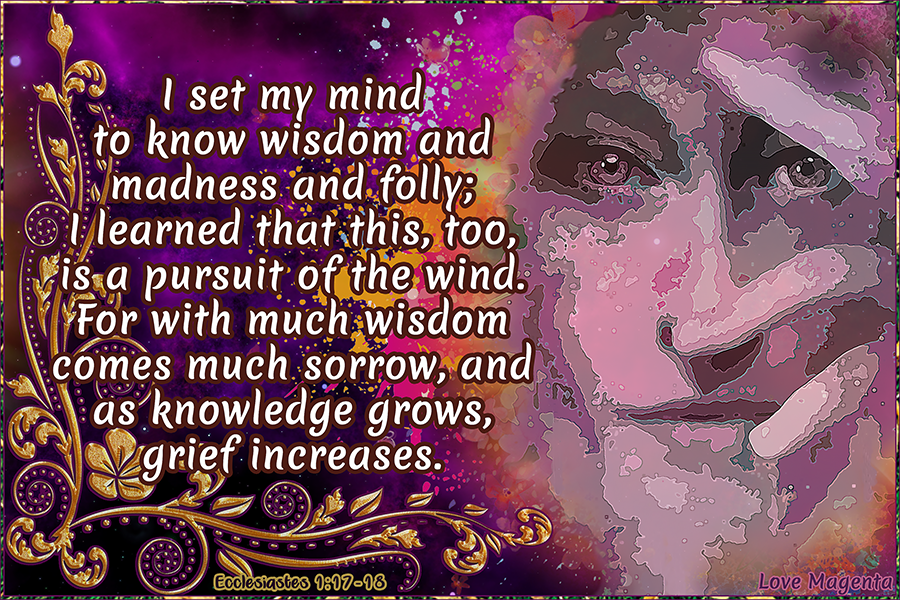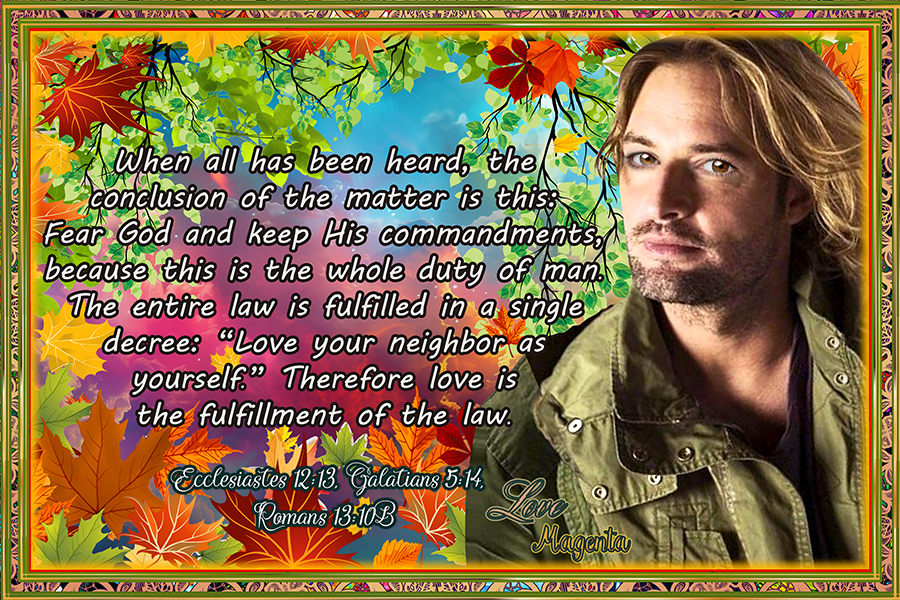I heard an excellent sermon a number of years ago that focused on the book of Ecclesiastes, and the pastor noted that James is an excellent complimentary epistle to Ecclesiastes. Both books fall within the category of "wisdom literature" with their short maxims that emphasize properly living a "righteous" and "prosperous" life in the flesh (Ecclesiastes) and in the Spirit (James).
Ecclesiastes was likely written by king Solomon later in his life. After succeeding his father, David, on the throne at a very young age, he started off down the right path by asking God for wisdom to govern the nation with a "discerning heart" to "distinguish between right and wrong" (I Kings 3: 9). God was pleased with this request and said, "...I will give you a wise and discerning heart, so that there will never have been anyone like you, nor will there ever be" (v. 12).
Solomon shares his wisdom through the book of Proverbs, Ecclesiastes, Psalms 72 and 127 along with the Song of Solomon. Early on in his career, he built upon David's success and led Israel to the height of their physical power and prestige as a nation. Unfortunately, unlike his father, he fell into heavy idolatry, had wives and concubines from other nations, and neglected his relationship with God to the point that Solomon's salvation is questionable (e.g. he is excluded in the list of "heroes of faith" in Hebrews 11).
Solomon lived a life of experimentation. Rather than focusing on God like David did, Solomon pursued a life of leisure and pleasure, but he sums up the results right at the beginning of Ecclesiastes that he felt emptiness in that lifestyle:
Ecclesiastes 1:1-2
New King James Version
The Vanity of Life
1 The words of the Preacher, the son of David, king in Jerusalem.
2 “Vanity of vanities,” says the Preacher;
“Vanity of vanities, all is vanity.”
James on the other hand begins his letter much differently, emphasizing right up front that he is a servant of God, and life is far from "vanity" when we are living in Christ:
James 1
New King James Version
1 James, a bondservant of God and of the Lord Jesus Christ,
To the twelve tribes which are scattered abroad:
Greetings.
2 My brethren, count it all joy when you fall into various trials,
3 knowing that the testing of your faith produces [a]patience.
4 But let patience have its perfect work, that you may be [b]perfect and complete, lacking nothing.
I've been looking forward to tackling these two challenging texts for quite some time, yet I may have bitten off more than I can chew. But, with your help, I'm excited about gaining more "wisdom" hopefully through this study and fellowship with all of you.
Ecclesiastes was likely written by king Solomon later in his life. After succeeding his father, David, on the throne at a very young age, he started off down the right path by asking God for wisdom to govern the nation with a "discerning heart" to "distinguish between right and wrong" (I Kings 3: 9). God was pleased with this request and said, "...I will give you a wise and discerning heart, so that there will never have been anyone like you, nor will there ever be" (v. 12).
Solomon shares his wisdom through the book of Proverbs, Ecclesiastes, Psalms 72 and 127 along with the Song of Solomon. Early on in his career, he built upon David's success and led Israel to the height of their physical power and prestige as a nation. Unfortunately, unlike his father, he fell into heavy idolatry, had wives and concubines from other nations, and neglected his relationship with God to the point that Solomon's salvation is questionable (e.g. he is excluded in the list of "heroes of faith" in Hebrews 11).
Solomon lived a life of experimentation. Rather than focusing on God like David did, Solomon pursued a life of leisure and pleasure, but he sums up the results right at the beginning of Ecclesiastes that he felt emptiness in that lifestyle:
Ecclesiastes 1:1-2
New King James Version
The Vanity of Life
1 The words of the Preacher, the son of David, king in Jerusalem.
2 “Vanity of vanities,” says the Preacher;
“Vanity of vanities, all is vanity.”
James on the other hand begins his letter much differently, emphasizing right up front that he is a servant of God, and life is far from "vanity" when we are living in Christ:
James 1
New King James Version
1 James, a bondservant of God and of the Lord Jesus Christ,
To the twelve tribes which are scattered abroad:
Greetings.
2 My brethren, count it all joy when you fall into various trials,
3 knowing that the testing of your faith produces [a]patience.
4 But let patience have its perfect work, that you may be [b]perfect and complete, lacking nothing.
I've been looking forward to tackling these two challenging texts for quite some time, yet I may have bitten off more than I can chew. But, with your help, I'm excited about gaining more "wisdom" hopefully through this study and fellowship with all of you.
-
2
-
1
-
1
- Show all



